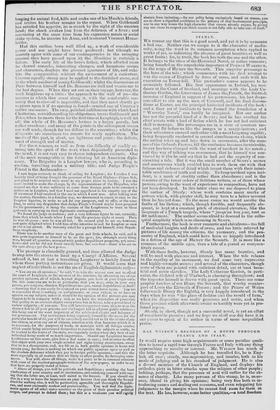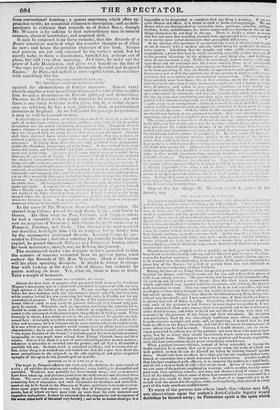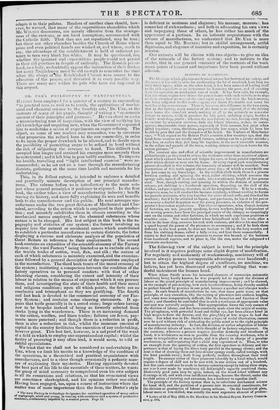RAE WILSON'S RECORDS OF A ROUTE THROUGH FRANCE AND ITALY.
Jr would require some high acquirements or some peculiar quali- ties to invest a rapid tour through France and Italy with any thing approaching to novelty or interest. Mr. WILSON has much of the latter requisite. Although he has travelled far, be is Eng- lish all over; sturdy, uncompromising, and insular, both in his mode of judging and in his standard of judgment. He is also a devout member of the Church of England, and displays his orthodox piety in bitter attacks upon the religion of other people; holding, perhaps, that the presence of zeal will suffice for the ab- sence of charity. Like many persons of this stamp, he is, more- over, liberal in giving his opinions; being very free both in in- troducing names and dealing out censures, and even relegating his judgments to the margin when he cannot find room for them in the text. He has, however, some better qualities,—a total freedom
from conventional humbug ; a quaint smartness, which often ap- proaches to wit ; an occasional richness in description; and an inde- pendence in criticism that reminds us of JOHN BELL, though Mr. WILso:s is tar inferior to that extraordinary man in natural acumen, classical knowledge, and acquired skill.
It may be supposed from these remarks, that the Records of a Route consist as much of what the recorder thought as of what he saw ; and hence the peculiar character of the book. Scenes and persons are not only coloured by the writer's mind, but be mostly tacks to them a dissertation, uncalled for, perhaps out of place, but still very often amusing. At Calais, he seeks out the grave of Lady HAMILTON, and gives us a homily on the fate of "the once lovely and adored, the afterwards deserted and despised Emma." At Paris, and indeed ill most capital towns, he exclaims with something like the " ning yoke which be who eat.,
The Apocalypse' heard cry in heaven lowl,"
against the abominations of foreign manners. Almost every church supplies a text upon Catholicism, awl a tabledltiite enables him to spin a dissertation on French gluttony and ill-breeding. Paestum itself furnishes him with materials for censure : not that there is any thing to blame in the place, but. by a skilful digres- sion on criticism, he has a very judicious fling at architectural imitators in England. As we had noted the passage for quotation,
it may as well be inserted at once.
In the buildings at Paestum, we behold not so much the elessical, as an heroic style of architecture—solemn, grandiose., sublime—sou:el:ling of which neither description nor the pencil can convey an eiptivalent idea. Ornatnent tittle is none; elegance is quite out of the question •, of heauty tin ro is hardly more ; lint they are stamped with an awful C11:1;;%* t1ittS121%.,:i 1,!:(111 tIII Mind. nearing aloft their shattered forms a-Midst siicici aDll solitude, they sac, p.a haps, or without a pmliaps, far more imp's:isle() ;,.s ruins than they would be as perfeet 15h-whites. Ily laying them bare, time has only rendered more prominently visible the Herculean compactures uf their frame. It has subdued their giant forms into poesv, and has Mendell n-ith their enemies, a softening touch of senti- ment and melancholy. iln rtsle, the Piestuni style is ne more a model for us than are the pyramids of Egypt. l'ul, ureser vitl in all its in1eglity, without the slightest intermixffire of any thing. foreign to it, or, at ad events, of any thins, not sufficiently accommodated ro it, it woeld beeonee quite preposterous. It utihrils nothing transkrable, nor con it lie nuele to aseindlate with the other stork materials of architectural design. Ilesides which, it noe.t 1,0 ailowed to be inoet intractable and unmanageable ; cartItle imbed of VIA:,I ii moet striking effect, yet an effect invariably the seine; ea:chiding fancy, atItuiting no diversity of ex- pression. It exhausts itself at on :'e, and a single etillies• of ffie Lind n•preients an entire cdiss. All is repetition—preeis•.!y the same tone. the :atile charaeter, again and again. A man in his sen-,s would as soon tIlink if putting himself
into a Roman toga, as dressing up his house in a liv_ey of Pe‘etten ;" yet tricks of the latter class have lain played. I Lave 1:11.11 cf a Villa being erected when the diameter cf the columns was greater than the width of the windows between them. Seel, s ind,ws and neettea!—there is not a more nauseous mixture in the whole nte'!iett.
In the route of Mr. WILSON tlIC/C is nollting partcular. Ile started from Calais; passed through Paris, Lyon:, and Turin, to Genoa. He then went to Pisa, I.e:tliorn, and Naples ; where he had a squabble with a puppy attaeln". of the Embassy, and saw an eruption of Vesuvius; and whence be made exentsions to Pompeii, Ptustutn, and Sicily. The Eternal City next received our traveller, to delight him with its temples, but to horrit'y him by the mummeries perkrined therein. Leaving Ileme, he pre- ceeded to Florence; and after satiating his curiosity in the Tuscan capital, he passed through Bologna and Ferrara to Venice, where his book tertninates,-though not, we believe, his journey. The sentimental reader %rho delights to have presented to him the essence of romance extracted from its gro-ser parts, must eschew the Records of Mr. RAE WiLsom. Many a day-dream will his plain speaking dissipate. It might be wrong to charge him with boking at the worst side of things, but certainly he paints nothing en beau. Yet, after all, there is force in truth. Take a couple of instances.
OUT-DOOR OCCUPATIONS IN SAVOY.
Almost the first trait of manners that presented itself to its in his Sardinian Majesty's dominions, was of a kind little calculated to impress us with any very high opinion of the habits of the people. We saw a rather aged female seated before her door knitting, with her countenance almost veiled by her long hair, while another behind her was examining her head, not a la Deaille, nor for any craniological purpose. The object or Objects of her exploration were very dif- ferent indeed—such as may easily be guessed, although they cannot very pro- perly be named. Wherefore such an operation, admitting the necessity for it, should be made an out-door scene, it is difficult to conjecture ; it is one better suited to the retirement of the closet than to the publicity of the high road. When formerly in Spain, I was much struck by the prevalence (if the pi actice. we wit- nessed here: it cm tainly very little corresponds with our notions of a land of chi- valry and romance, for fay customs can be more unromantic or less captivating. It Is one which no poet or novelist would venture even to allude toes a national characteristic ; for in such cases their dark-eyed Spanish damsels and maidens, " the warm beauties of the South," would not appear the most delicate creatures imaginable, or very much more refined than Teniers' Flemish boors and their vrows. But so it is, there is a sort of conventional hypocrisy in such matters; whatever is attractive is crewded into the picture, and all that is distasteful is carefully left out. In short, truth is sacrificed to effect ; and to secure this ef- fect, every thing is so tricked out and decked out that the copies bear about the same resemblance to the originals as the silk-stockinged and gatize-draperied nymphs of the opera do the peasant girls of real life.
POMPEII AS IT IS AND AS IT WAS.
The truth is. Pompeii offers to our view only the skeleton, the mere wreck of a city ; all exhibits devastation and confusion ; every building is dismantled and
unroofed. Whatever was portable has been carried away ; and even mosaies have been taken up, and pictures painted on the walls cut out and detached from them.The more solid parts-are standing, though denuded ; and, according to remaining bits of ornaments and such documents for furniture and embellish- ment as arp to be found in the Museum at Naples, architects have made restora- tions upon paper that convey a very lively idea of Pompeian atria and apart- ments, but of which we here meet with no more than the rude materials and imperfect indications. It must be admitted that the singularity and strangeness of the scene takes hold of the mind very forcibly ; and as far as names alone go, it ia One a the kw things Mr. 1.1, Lsox Lama to pfaise in his travels, was
THE D• ii 91' SE AT PALL:1MA).
The inmates are divided into two general chissee ; vie. tlinse who at e adroit hal
gtatnitoteds, and those whoie It ;ends ply for tlitit stitiport. Whet; a is first received, he is 'darnel foe a certain number of (1.1)s in a room ;Tat t Clout the rest, in older that Lb; peculiar kind of derang,emeist May los tu, ;411 by the medical attendants, and the particular inotle of treatment requited for it ascer- tained. Great care is taken to disci intinatc with preciiion the es let s;•et•ie: and deArce of insanity, and the causes whielt have »t.t.it-itried it. Confo;;;:able with tins system, one excellent regtdation 1114 111.T21 ;1101,t?d, '1% 1;411 iS t11:II ui kITI/1:1;: a list or register (Ilan the patients ; whet ii it their naives, age:, previous proft•s- impossible to be dissatisfied or complain that any thing i3 wanting. If we re- quire illusion and effect, it is better to stick to books and engravings: We are shown what are distinguished as ves,ibules, atria, portkoes, eshedrae, tablina, triclinia, baths, ambuationes, &e. whose names makes a promise to the ear the things themselves do not keep to the eye. There is hardly a closet or recess that has not some fine-sounding classierd term appropriated to it ; consNuentl there are far more verbal distinctions than perceptible differences. # Y In my opinion, this specimen of an ancient city is not at all calculated to put us out of conceit with a modern one,, the latter being fir preferable. in Oiliest every respect. Admitting that the temples and other priblic structures were magnificent, a point that may be easily conceded, especially as they were set off to the greatest advantage by the plainness of every thing else, such buildings alone do not constitute a city. Neither do exceedingly narrow streets, ith only open shops and the entrances into the houses totem us them, at all correvond with modern ideas of grandeur, convenience, or cheerfnInees. On Cie contra: I-, so far from pat taking of, they are directly in opposition to such qualAies. Ifie homes were not at all better suited to any of our notions of cm:shirt no.1 aremn- laudation, but were rather most ostentatiously inconvenient. Effect and display there certainly must have been ; far, on fast entering, nearly the whole of the intelior was thrown open to view in succeseive parts, to such a degree as te de- stroy all privacy, and, links, in very spacious mansions, to leave hardly any space for a tolerably-sized room of any kind. The perspective effect on lithe- imp a vista varied by colonnades and atria, by iii visions lame ceded, now open to the sky, by parts nun' contracting and then wren) exiesialing, lied by Cc ,:lot tie garden at the extreme background, mug haveliejn pleaiing and striking enough —quite scenic in its arrangement—although it could alio be wished that gt eater variety had been shown in such arrangement, in4ead of its beilne made in every ease so nearly the same. Still the whole of this amounts to no more tl 311 V:
we should noiv mid tulle as one continued vestibule : there were divisions, but no separation, exciTt such as might be occasionally made by curtains or draperie,.
'he rattms appear to It lye detached, and snust either have beest vet y badly lighted or else greatly expwted to the weather ; which, let people sly iv hut they will about the extramdinary fineness of the effinate, :unit have b..en at- tended with much inconvenience. IDDIe 111.1.1 W0111ii have been put up with had the inhabitants had the means of retnatlying it. In stteh rooms, fie initture, which had a latite unglazed window openi, ,• 1,, the peristyle id' the flu tiler coutt, there could' have !teen no pi ivaey ; I, • unless the enart itself was I- 0, ululutiutil.
ei
ClIri• t
• of light I))
tic• 1:011r- ; c!lxr our-
in r, ceuld have been ap- kept perfectly secluded from all nal woon, ie ally liable to hut overheard. Althou;ffi elm- chide eye. curiosity, they would be a utast it osity, as they 'a mild sometimes have serc•ened a double advantage. The general smallness t,: tl. int.reirtal tlw inconveniences ;nit adveited the maim seldom exceeded what in England iz literally impossible " to swing a eat in t
closets in being perfertly d miltss thy us means of an up it sp:we left between the ihu ease. Perhaps the). xvere used a, mere eh:, r(sc snch gleamy, ill-ventilat••ti cells, all plied, it is not .xtsy to conjecture.
During the time of my being, there, die greater part of the patients assembleil together for dinner, entering the room One by one, and taking their places at table in an ordeily manner. On grace being said by one of the attendants, they all stood up and chanted a sort of hymn : after this their repast commenced, which consisted of soup, carried round by attendants, who filled up the plate of each individual in turn. This was succeeded by meat and vegetables, cut into small pieces before being brought in ; for neither knives nor forks are allowed, but merely spoons. Oranges were liberally distributed among them, being con chimed very beneficial ; and I was assured that some of them had been known to devour upwards of thirty in a day. Coneeiving that those present could be only such of the patients as had become in some degree tranquillized, I was rather astonished when some among them were pointed out to me as labouring under decided mania, and liable to break out into fits of frenzy, were they not restrains:411)y the presence of the Baron and their attendants. My attention was particularly fixed by one exceedingly handsome man, whose appearance bespoke superior manners and rank, anti, on inquiring, I learned that he had been an officer in the King's Guaals, and had lost his reason in consequence of some affront that he hind received. 'Visitors, I should obseive, are on no ac- count permitted to address any of the patients, not even those who appear most quiet, lest by so doing they should incautiously touch upon any remark that might agitate them. This appears to be a very prudent and humane regulation, since the least indiscretion might prove exceedingly mischievous. When a patient becomes furious, instead of being manacled, or having Ids limbs confined, he is merely shut up in an empty room, the walls of which are well padded, so that he can do himself no injury by striking himself against them. Should this have no effect, lie is then put into the machine before men- tioned, or soinetimes into a strait waistcoat for a certain time.
that has been employed with efficacy, is to immerse the patient
Anotheriti a tepid ebtahtoh:1, and let fall a shower-bath of cold water on his head. In one of the apartments we saw some of the patients employed in weaving, and in another, females occu- pied with their spinning-wheels; and were also shown a kind of chapel at the back of die building, which some of them had constructed and ornamented in a way that does credit to their ingenuity. In short, it is impossible not to be struck with the admirable discipline, order, and regularity, that prevail in every part of this truly excellent establishment. To many of the persons into whose bands this volume may fall, any observations upon time author's Anti-Catholic bigotry would doubtless be thrown away; its Protestant spirit is the spice which adapts it to their palates. Readers of another class should, how- ever, be warned, that many of the superstitious absurdities which Mr.WILsoat denounces, are merely offensive from the strange- ness of the custom', or are local corruptions, unconnected with the Catholic faith. That they are not repudiated, may be title; but there are other churches besides the Church of Rome where pious and even political frauds are winked at, and where, south to say, the advantage of the establishment is held of sufficient po- tency to turn very black lies white. It may be questioned, too, whether the ignorant and superstitious people would not persist in their old practices in despite of authority. The Romish priest- hood, as a body, undoubtedly oppose the instruction of their flocks; but many Englishmen must be old emaigh to remember the time when the clergy ()nil° Established Church were averse to the education of the people, and thwarted it in every possible way. There are Many now within its pale who have not improved in this respect.




























 Previous page
Previous page